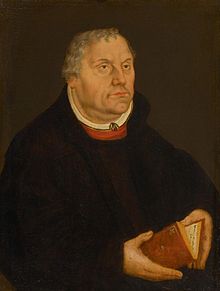Erhalt uns, Herr, bei deinem Wort, BWV 126
|
Erhalt uns, Herr, bei deinem Wort BWV 126 |
|
|---|---|
| Chorale cantata by J. S. Bach | |

Martin Luther, author of four stanzas of the hymn, by Lucas Cranach the Elder
|
|
| Occasion | Sexagesimae |
| Performed | 4 February 1725: Leipzig |
| Movements | 6 |
| Cantata text | anonymous |
| Chorale | "Erhalt uns, Herr, bei deinem Wort" |
| Vocal |
|
| Instrumental |
|
Erhalt uns, Herr, bei deinem Wort (Sustain us, Lord with your word),BWV 126, is a cantata by Johann Sebastian Bach for use in a Lutheran service. He composed the chorale cantata in 1725 in Leipzig for the Sunday Sexagesimae, the second Sunday before Lent, and first performed it on 4 February 1725. It is based on the hymn "Erhalt uns, Herr, bei deinem Wort" by Martin Luther, published in 1542. The hymn text at Bach's time also included two stanzas by Justus Jonas and Luther's "Verleih uns Frieden gnädiglich".
An unknown librettist retained four of these seven combined stanzas, using the first and the two last unchanged as customary, and expanding the third by adding text for a recitative. He paraphrased the other stanzas for two arias and another recitative. Bach structured the cantata in six movements and scored it for three vocal soloists, a four-part choir and a Baroque instrumental ensemble of trumpet, oboe, strings and continuo. The first movement is a chorale fantasia dominated by the trumpet. In the unusual third movement, Bach has an alto and a tenor voice alternate for the recitative, while they sing the lines from the third hymn stanza in a duet. The fourth movement is a dramatic bass aria, accompanied by a restless continuo. Due to the compiled hymns, the melody of the closing two stanzas is different from the one used in movements 1 and 3.
Bach held the position of Thomaskantor (director of church music) in Leipzig from 1723. During his first year, beginning with the first Sunday after Trinity, he wrote a cycle of cantatas for the occasions of the liturgical year. In his second year he composed a second annual cycle of cantatas, which was planned to consist exclusively of chorale cantatas, each based on one Lutheran hymn.
...
Wikipedia
